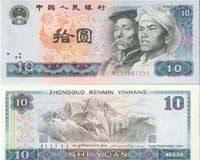| . |  |
. |
Washington (AFP) Oct 6, 2010 China needs a stronger currency to boost domestic demand and reduce its reliance on exports, a rebalancing needed across Asia to ensure the region's long-term growth prospects, the IMF said Wednesday. In its latest world economic outlook, the International Monetary Fund said that for China, it was "critical to enhance the role of household consumption in domestic growth" to drive the economy, now the world's second-largest. "To the extent that a stronger Chinese currency eases this process, other surplus countries in the region could follow suit, which would facilitate the needed shift towards domestic sources of growth," the IMF said. The Washington-based lender maintained its 2010 gross domestic product growth forecast for China at 10.5 percent from its last estimate given in July, while revising up its prediction for India to 9.7 percent from 9.4 percent. But to draw more investment to overhaul India's dilapidated infrastructure, the government must accelerate the development of its financial sector, the report said. As a whole, according to the IMF, Asian economies will expand an average 7.9 percent this year -- higher than the 7.5 percent forecast in July -- before slowing to 6.7 percent in 2011 as stimulus measures introduced to combat the global financial crisis are withdrawn. "Industrial production and retail sales have been strong in China and India, among others," the IMF said. "Robust activity in these countries in turn is helping power growth in the rest of Asia." The IMF's renewed call for a stronger Chinese currency comes amid growing pressure on Beijing to loosen its grip on the yuan in the runup to the IMF's annual meeting beginning Friday, where the issue is likely to loom large. The United States and Europe -- still struggling to recover from the crisis -- have butted heads with China over the yuan, which they claim is undervalued by as much as 40 percent and gives its exports an unfair trade advantage. A trio of top eurozone officials on Tuesday urged Chinese Premier Wen Jiabao to live up to a June vow to make the yuan more flexible, as US lawmakers pursue punitive sanctions against China over its currency policy. The yuan's gains have been minimal since China's promise in June, while Wen has warned that allowing the currency to strengthen too much could wreck Chinese exports, putting at risk millions of jobs. The IMF, under growing pressure from Washington and others to do more to stop a wider dispute from erupting, said a stronger currency would help stem speculative capital inflows. "Where large current account imbalances may reflect an undervalued exchange rate, currency appreciation is the best response to capital inflows," it said. Beijing has been cracking down on "hot money", which enters and exits countries in search of swift profits and is considered risky because it often departs at the first sign of weakness in an economy. But a "coordinated" response by Asian nations was needed, the IMF added. "Resistance to currency appreciation by one economy could discourage others because of competitiveness concerns," said the report, which came after Japan intervened in the foreign exchange markets for the first time since 2004. Japan, which has come under US and European fire for its intervention, is expected to see an economic expansion of 2.8 percent in 2010 compared with the IMF's 2.4 percent forecast in July, before slowing to 1.5 percent in 2011. "Japan's economic prospects remain weak, given lackluster domestic demand and a lack of fiscal room to further boost the economy," the report said. Southeast Asia's five biggest developing economies -- Indonesia, Malaysia, the Philippines, Thailand and Vietnam -- were seen growing by an average of 6.6 percent this year, up from the 6.4 percent forecast in July, underpinned by exports and domestic demand. Growth was expected to slow to 5.4 percent in 2011. The IMF maintained its growth forecast for Australia's resource-driven economy at 3.0 percent this year before accelerating to 3.5 percent in 2011 thanks to increasing Chinese demand for its exports. "Asia's medium-term prospects depend on how successfully it is able to rebalance the drivers of growth -- with greater reliance on domestic sources compared with external demand," the IMF said.
Share This Article With Planet Earth
Related Links Global Trade News
 Europe pressures China as currency 'war' bites
Europe pressures China as currency 'war' bitesBrussels (AFP) Oct 5, 2010 Europe pressured China Tuesday to let the yuan rise as fears grew of a global "currency war" while a French call for a new, more stable world monetary order received short shrift from Germany. A trio of top eurozone officials urged Chinese Premier Wen Jiabao to live up to a June vow to make the yuan more flexible to counter accusations Beijing deliberately undervalues its currency so as to b ... read more |
|
| The content herein, unless otherwise known to be public domain, are Copyright 1995-2010 - SpaceDaily. AFP and UPI Wire Stories are copyright Agence France-Presse and United Press International. ESA Portal Reports are copyright European Space Agency. All NASA sourced material is public domain. Additional copyrights may apply in whole or part to other bona fide parties. Advertising does not imply endorsement,agreement or approval of any opinions, statements or information provided by SpaceDaily on any Web page published or hosted by SpaceDaily. Privacy Statement |